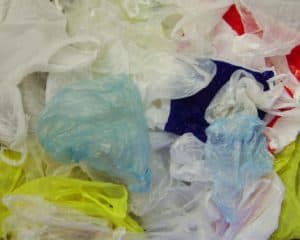 One of the first things that comes up for folks when we start talking about plastic, plastic use, and plastic reduction is the one-use plastic shopping bag. These bags are ubiquitous as well as devastating in the environment. Light enough to float in the wind, this plastic gets stuck in tree branches, tangled in recycling machinery, and shredded into waterways. One use plastic bags are a constant presence for many Americans, and we often don’t realize just how much we are contributing to the problem.
One of the first things that comes up for folks when we start talking about plastic, plastic use, and plastic reduction is the one-use plastic shopping bag. These bags are ubiquitous as well as devastating in the environment. Light enough to float in the wind, this plastic gets stuck in tree branches, tangled in recycling machinery, and shredded into waterways. One use plastic bags are a constant presence for many Americans, and we often don’t realize just how much we are contributing to the problem.
What can you do to help? Many of us are used to seeing reusable bags being used and sold at many grocery stores. These are a great way to reduce the plastic used in shopping. The trick is to make it a habit to carry them in your car, or get a small, packable version and keep it stored in your purse. There are two main types of bag that are used: canvas and reusable plastic. There are pros and cons to each. Reusable plastic bags can often be found for cheaper than fabric and are also more widely available. They can sometimes also be made from recycled materials, which is ideal for reducing plastic consumption. However, these bags are sometimes harder to clean. Canvas bags are another common option. These are much easier to clean- you can pop them in with the rest of your laundry and clean them in no time. They are also not made out of plastic, so they don’t ultimately contribute to the continued plastic problem. Reusable bags should be cleaned frequently to prevent contamination of food products. It is also a good idea to dedicate one bag to meat only, and others to produce.
 Produce bags are also a source of flimsy plastic bag material. These bags, found at several stations around the grocery store are used to bag produce and meats. Good news: produce bags can also be replaced with reusable alternatives! Our friends at Growing Places recently did a demonstration at the Leominster Farmers Market where they made cotton produce bags out of old t-shirts. Thin Cotton bags can be used for most produce instead of disposable plastic produce bags. The exception to this is meat, which should still be bagged in disposable plastic to prevent cross-contamination.
Produce bags are also a source of flimsy plastic bag material. These bags, found at several stations around the grocery store are used to bag produce and meats. Good news: produce bags can also be replaced with reusable alternatives! Our friends at Growing Places recently did a demonstration at the Leominster Farmers Market where they made cotton produce bags out of old t-shirts. Thin Cotton bags can be used for most produce instead of disposable plastic produce bags. The exception to this is meat, which should still be bagged in disposable plastic to prevent cross-contamination.
Reusable bags require a change in habits. Thinking ahead and making sure bags are available when you need them- in your car, purse, and by the door- will help make the transition easier. This change can have a real impact! Americans use more than 380 billion plastic bags each year, according to the EPA.
Have you made the switch? Do you use reusable plastic or canvas bags? Do you have other plastic reducing suggestions? Email suggestions to info@northcountylandtrust.org, or comment on our Facebook Post for this month’s plastic purge.
